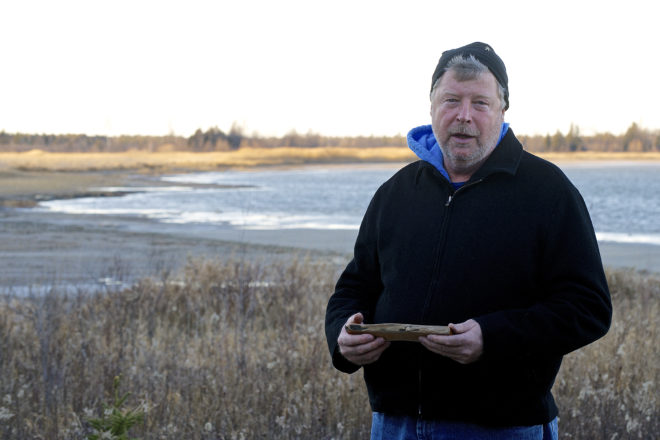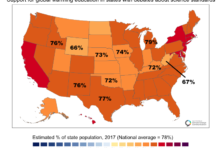The Climate Corner: A Fisherman’s Perspective
- Share
- Tweet
- Pin
- Share

By Charlie Henriksen
I believe in science, but my life is ruled by the unpredictability of Mother Nature. Weather is changing and so is our environment and many of these changes occur with astonishing speed. I am a food producer and take great pride and care in providing a healthy, local product.
A very obvious example of Mother Nature’s unpredictability is the current water levels of Lake Michigan. All of our justified concerns about the dire consequences of low water have rapidly changed to high water worries that no one did or could have predicted. It is also similar to the recovery from low water in the mid-1960s that were all but forgotten by the early ’70s. Fishermen always believed that high water made for better whitefish reproduction. We shall see.
My observation is that severe weather events are more frequent. The occasional devastating storm that moves our gear seems to happen three times per year rather than every three years, which has made it difficult to fish, particularly for smaller operations. We check the weather three to five times per day, make use of the advancements in forecast technology, check both the hourly and the 10-day forecasts, and look for trends in how fast it’s all changing. We also have developed ways to survive, using stronger gear, more flotation on our nets and other new techniques.
Invasive species have caused incredible challenges for us. The current uproar about Asian Carp coming from the Mississippi River may or may not be justified. Dr. Phil Moy, formerly with Wisconsin Sea Grant, doubted that the carp would “want” to be in Lake Michigan because it’s not their typical habitat, but we would rather not find out. Maybe they will clean up the slime and eat the mussels.
The real damage to our ecosystem has been the St. Lawrence Seaway. The spread of alewife, lamprey eels, and subsequent fish devastation all altered the lakes forever. The more recent invasives from ballast water have been just as challenging. Mussels and the cladophora algae have caused huge problems for the commercial fisheries. The zebra mussel decimated the inshore diporia, which was the prime food for whitefish. As the mussels moved deeper they pushed chubs off their inshore summer grounds and both species’ growth rates slowed.
Meanwhile the water clarity improved, which caused better hunting for the obnoxious number of cormorants, further hurting the inshore whitefish fishery. Then came the quagga mussel with no temperature or depth restriction. Chubs stopped growing completely. How many are still out there and how deep they have moved is up for debate but the great fishery that recently existed is but a shadow of itself.
Other consequences of these changes affect salmon and trout. The salmon were planted to help control alewife along with commercial trawling (which has been stopped). The salmon are now reproducing but their alewife food base is at risk because of problems with the alewives’ microscopic sources of food. Remarkably, lake trout, after 50 years of massive planting, (originally to restore the commercial fishery), are also reproducing because they no longer have alewife in their diet. We now know the enzyme thiamine in the alewife inhibited lake trout reproduction.
Another invasive that did not cause the impact that was first predicted is the goby. Initially predicted to eat eggs and ruin many of the fisheries, especially bass, they now fill an important role as food for bass. The incredible bass sport fishery we now have relies on the goby and, in a very strange turn, so do whitefish and other species.
Whitefish are proving to be one of the most adaptable animals in nature. The older guys I first fished with would not believe me if I could tell them where and how we fish today. Cladophora and mussels have made spawning success more difficult in northern Lake Michigan, but whitefish have colonized rivers in lower Green Bay where conditions are better. PCB cleanup has probably helped make this possible. When cladophora and mussels become less of a problem, I am sure whitefish will also return to the lake in great abundance, but for now the overall stock is thriving.
To succeed in the modern fishery you need to be able to adapt, be open to new ideas and have the wherewithal to try them. Managing the resource is a bit of a crapshoot because things do not go as planned and Mother Nature is in charge.
Whatever you believe or whatever label you want to put on these changes, respecting nature and our environment is of paramount importance.
The Climate Corner is a monthly column featuring a variety of writers from around the state and Door County addressing various aspects of the challenges and opportunities climate change presents. The column is sponsored by the Climate Change Coalition of Door County, which is dedicated to “helping to keep our planet a cool place to live.” The Coalition is always open to new members and ideas. Contact the Coalition at [email protected].

